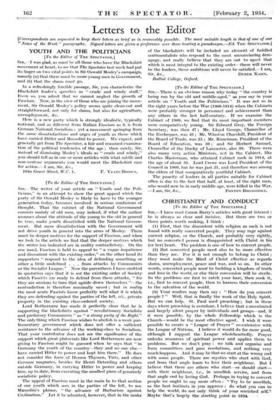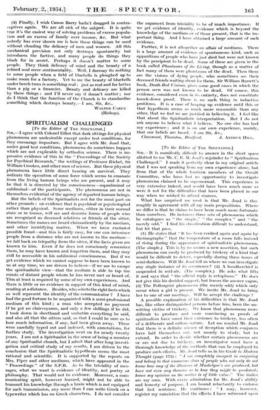CHRISTIANITY AND CONDUCT [To the Editor of THE SPECTATOR.] SIR,--I
have read Canon Barry's articles with great interest : he is always so clear and incisive. But there are two or three points worth making, I think : (I) First, that the discontent with religion as such is not found with really converted people. They may rage against current religion, or the Church, and probably very -rightly, but no converted person is disappointed with Christ in his (or her) heart. The problem is one of how to convert people.
(2) But converted people need also to be more effective than they are. For it is not enough to belong to Christ ; they must make the Mind of Christ effective as regards slums, unemployment, peace and war, and so on. In other words, converted people must be building a kingdom of truth and love in the world, or else their conversion will be sterile. So the problems are first to catch your hare, then cook it, i.e., first to convert people, then to harness their conversion to the salvation of the world.
(3) Your readers may then say : "How do you convert people ? " Well, that is finally the work of the Holy Spirit. But we can help. St. Paul used preaching ; but in these days where preaching is overdone, I believe that concentrated and largely silent prayer by individuals and groups—and, if it were possible, by the whole Fellowship which is the Church—would be the most effective agent. I wish it were possible to create a "League of Prayer" co-extensive with the League of Nations. I believe it would do far more good, although I support the League wholeheartedly. Prayer unlocks resources of spiritual power and applies them to problems. But we don't pray : we talk and organize and form committees and pass resolutions, and nothing very much happens. And it may be that we start at the wrong end with some people. There are mystics who start with God, and from that angle learn to love their neighbour. But I believe that there are others who start—or should start— with their neighbour, i.e., in unselfish service, and from that angle end by loving God. Perhaps in trying to convert people we ought to say more often : "Try to be unselfish, as the best instincts in you approve : do what you can to help the world, do not only think of your wretched self.". Maybe that's largely the starting point in 1934
(4)- Finally, I wish Canon Barry hadn't dragged in contra- ceptives again. We are all sick of the subject. It is quite true it's the easiest way of solving problems of excess popula- tion and an excess of family over income, &e. But what nobody has ever shown rne is how these things can be used without clouding the delicacy of men and women. All this mechanical prevision not only destroys spontaneity but introduces the furtive, and many people do things they blush for in secret. Perhaps it doesn't matter to some people. They think delicacy of mind and the beauty of a refined soul mere sentimentality. Well, I daresay its nothing to some people when a field of bluebells is ploughed up to make room for a factory. Yet to me the beauty of bluebells under beech trees is something real : just as real and far better than a pig or a financier. Beauty and delicacy are killed by these things : and I'll never say it doesn't matter ; nor do I think that the function of the Church is to standardize something which destroys beauty.—! am, Sir, &c., WALTER CAREY (Bishop).









































 Previous page
Previous page